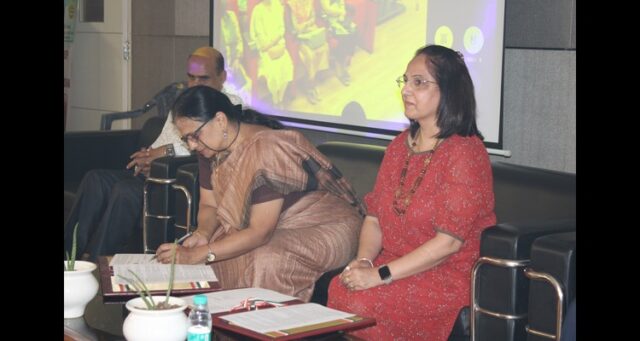The All India Institute of Ayurveda (AIIA), which is the Apex Indian institute of Ayurveda under the Ministry of Ayush, has signed a Memorandum of Understanding (MoU) with the National Institute of Advanced Industrial Science and Technology (AIST) of Japan recently. AIST is a reputed organisation and one of the largest public research organizations in Japan that primarily focuses on technologies and on “bridging” the gap between innovative technological seeds and commercialization. The director of the AIIA, Prof. Tanuja Nesari, and Dr. Tamura Tomohiro, Director General of the Department of Life Science and Biotechnology, Japan, who was present, virtually signed the MoU. Renu Wadhwa, Prime Senior Researcher, Head AIST-India DAILAB, Dept of Life Science and Biotechnology, made her gracious presence with the effort through which the collaboration became a reality. Some of the other dignitaries who were present virtually at the meeting were Dr. Manoj Nesari, Advisor, Ministry of Ayush; Dr. Chiba, Director, AIST, Japan; Dr. Ohmiya Yoshihiro, Principal Senior Researcher, AIST; Dr. Sunil Kaul, Invited Senior Researcher, Dept. of Life Science & Biotechnology, AIST; Mrs. Sheila Tirky, Representative of MoA.
The Significance of the MoU
By signing this MoU, AIIA aims to promote the research activities of the institute both at the national and international levels. This will enable both nations to promote collaboration in the research domain and capacity building in the spheres of the Indian Ayurvedic system of traditional medicine. These initiatives will be implemented in support of the Ministry of Ayush.
The scope of activities that are deliberated upon by the participants incorporates research activities in the domain of Ayurveda that include studies in design and execution to develop evidence-based guidelines for assimilating the principles and practices of Ayurveda with conventional medicine. Moreover, evolving safety standards and protocols for the use of Ayurveda in conformity with medical guidelines, exchanging researchers, scientists, and staff as determined by the collaborators on a project-to-project basis, were initiated. Participation of students in the activities of cooperation to achieve excellence in Ayurveda has also been focused on achieving scientific advances, tools, and techniques.
During the COVID-19 pandemic, a study by the Indian Institute of Technology (IIT), Delhi, and AIST was conducted, which was on ashwagandha as an efficient anti-COVID-19 drug.
The AIIA has already signed MoUs with Western Sydney University, Australia; European Academy of Ayurveda, Bernstein, Germany; College of Medicine, UK; Graz Medical University, Austria; Federal University of Rio de Janeiro, Brazil; and London School of Hygiene & Tropical Medicine, UK.









